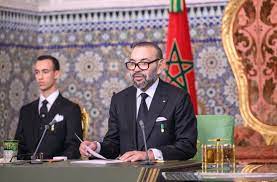
Crown Prince Moulay El Hassan chaired, on Wednesday, the inauguration session of the new members of the Academy of the Kingdom of Morocco, and the opening of the first session of this prestigious institution under its new configuration.
The session was marked by a Message from King Mohammed VI to the members of the Academy that was read out by the Academy’s permanent secretary, Abdeljalil Lahjomri.
In this message, the Sovereign said that the Academy of the kingdom of Morocco has become a beacon of cross-continental thought and research as well as a platform for honing intellectual, academic and scientific skills in all areas of the humanities and social sciences.
“It has contributed to developing and enriching research while highlighting the historical and cultural depth that the Kingdom of Morocco has acquired over the centuries,” emphasized the King.
To enable the Academy to discharge its lofty mission in the best possible way, he said “I have sought, since 2015, to reactivate it and revisit its structure,” the aim being “to bring it in line with the goals and stipulations of the Kingdom’s Constitution, which seeks to preserve our national identity, with its Arab-Islamic, Berber and Sahrawi-Hassani components, as well as its African, Andalusian, Hebrew, and Mediterranean ones.”
King Mohammed VI also called on the members of the Academy to promote knowledge and harness science to achieve a sound progress that is likely to safeguard the nation’s identity, protect it from risks and deviations, and endow societies with inspiring diversity and intellectual pluralism.
The Sovereign pointed out that “contemporary societies are affected by rapid, intersecting social, cultural, and economic transformations. They evolve through change, not stagnation. Therefore, promoting knowledge and harnessing science is what is actually at stake in order to achieve sound progress, the kind that enables you to safeguard the nation’s identity, protect it from risks and deviations, and endow societies with inspiring diversity and intellectual pluralism.”
The King argued that the progress of societies cannot be achieved without intellectual and cultural revival, and without an environment conducive to the production of knowledge. Bringing about that environment hinges on the extent to which societies contribute to cultural development, he said.
He stated further that thanks to its rich and diverse cultural heritage – tangible as well as intangible, Morocco was able to feature high among the countries of the world in terms of the cultural landmarks registered on UNESCO’s World Heritage List.
The Academy of the Kingdom of Morocco has carved out a special place for itself – domestically and abroad – over the three decades since its establishment in 1977, thanks to its contributions on the subject of values, which are one of the pillars of human life.
As to as the main topic chosen for this session “The Family and the Crisis of Values”, the King commented that “it is an important and relevant subject given, in particular, the disruptions – even the loss sometimes – of frames of reference in the world. Hence the need for thorough reflection on this fundamental issue, and for a clearheaded scientific study of current transformations and their repercussions at all levels, especially on family cohesion and social solidarity.”
It is a fact that addressing the question of values, together with their manifestations and underpinning factors, is one of the Academy’s lofty missions. This is because values play a crucial role in shaping the common principles of mankind by enhancing one’s identity, valuing cultural and linguistic diversity, and strengthening them through practice and creativity, as part of the nation’s intellectual life and openness to civilizations and cultures, King Mohammed VI stated further, recalling that for this reason, the Academy of the Kingdom of Morocco has been seeking to achieve a “civilizational partnership” that transcends differences and builds on close relations, interaction and understanding, while remaining open to scientific and intellectual developments, and committed to common human values and principles.
During the session, Mohamed Sghir Janjar, in an address on behalf of the resident members, commended the Sovereign for his concern to promote the institution so that it fulfills its mission and achieves the cognitive and civilizational objectives for which it was created.
Referring to the theme of this session, “The family and the crisis of values”, Janjar stressed that the challenge of “the crisis of values” is no longer limited to developed industrialized societies, but also concerns other societies on the southern shores of the Mediterranean, which are undergoing profound changes, linked in particular to demographic transition, the rapid and intense exodus of people from the countryside to the cities, and the generalization of education.
In an address on behalf of the Academy’s associate members, Souleymane Bachir Diagne (Senegal) emphasized the importance of the main theme chosen for this session, noting that “this subject lies at the heart of the many questions posed by the times we live in, in all countries, under all latitudes”.
In the reflections that will be carried out on this subject, particular emphasis will be placed on the family for the responsibility and the eminent role that fall to it, and from which it cannot shirk, he said, adding that rather than simply accuse it of resigning and therefore of being a factor in the crisis of values, we will examine above all the way in which it itself suffers the destructive impact of the economic and social crisis widespread everywhere due to neoliberal globalization which maintains the inequalities within and between Nations.
